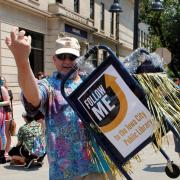Self Help
I didn't know I needed this : the new rules for flirting, feeling, and finding yourself
Eli Rallo
306.73 /Rallo
Self Help
"From TikTok star Eli Rallo, an irreverent, laugh-out-loud funny, and searingly honest take on modern dating and romance with tips, tricks, and survival-guide style rules. I Didn't Know I Needed This is the dose of confidence every girl needs to live their life on their own terms. Eli Rallo is a social media superstar, a Carrie Bradshaw for the TikTok age, a true romantic at heart, and the best friend every young woman wishes she had. As someone who prides herself in feeling fully and deeply, Eli is on the ride with you, kissing the frogs, sending (and deleting) the risky DMs, climbing down frat house gutters, making the friends you'll have for life, all while finding love and falling in love with yourself and learning that everything will be alright. In this earnest and vulnerable look at what it's really like to date as a young woman in the modern world of dating apps, rotating rosters, and social media snafus, Eli gives her rules for each stage of the game-tried and true tricks of the trade. I Didn't Know I Needed This follows the natural lifecycle of dating, starting with being single, flirting, and navigating the apps to going on dates, having sex, falling in love, and managing relationships, to finally dealing with heartbreak, finding closure, prioritizing your friends, and honoring your life. Discover the rules that have worked for her, and garnered her more than a half million TikTok followers. With touching stories of her own adventures and mishaps, Eli helps you navigate dating in a way that's frank, honest, funny, and relatable, giving the advice that you didn't even know you needed"--
The art of talking with children : the simple keys to nurturing kindness, creativity, and confidence in kids
Rebecca Givens Rolland
155.413 /Rolland
Home, Self Help
A Harvard faculty member and oral language specialist provides adults with evidence-based tools and techniques to help them have productive and meaningful conversations with children of all ages.
A really good (and relatively short) read on developing better strategies for engaging kids, both the ones you're raising at home and those you encounter in the community. I got a lot of good pointers from this, and loads of conversation starters for all ages, too! -Amanda
Magic words : what to say to get your way
Jonah Berger
153.852 /Berger
Self Help, Business
"A book about how to use words in a way that is most persuasive"--
This is brisk read that is especially helpful for students and young professionals as they learn how to interact with their colleagues in a positive way. I think most readers will get a few good takeaways from this! -Amanda
The PARA method : simplify, organize, and master your digital life
Tiago Forte
658.4038/ Forte
Business, Technology, Self Help
Living a modern life requires juggling a ton of information. But we were never taught how to manage this information effectively so that we can find what we need when we need it. In The PARA Method, Tiago Forte outlines a simple and intuitive four-step system that will help us sort all the information flooding our brains into four major categories—Projects, Areas, Resources, and Archives—allowing us to manage our commitments while achieving our goals and dreams. -Projects are specific, short-term efforts that you are actively working on with a certain goal in mind, such as completing a website or renovating your bathroom. -Areas are the larger, ongoing areas of responsibility (health, finances, etc.) that encompass those specific projects. -Resources include content on a range of topics you’re interested in or that could be useful for your projects and areas. -Archives include anything from the previous three categories that is now inactive, but you want to save for future reference. With his easy-to-understand and engaging voice, Forte outlines his best practices and tips on how to successfully implement PARA, along with deep dives on everything from how to adopt habits to stay organized to how to use this system to enhance your focus. The PARA Method can be implemented in just seconds but has the power to transform the trajectory of your work and life using the power of digital organization ~Amazon.
A vey quick, informative read. Although a bit wordy in my opinion, it is packed with good approaches, guidance and mental framing for taming and easily managing all the files, documents, and other saved bits floating around on your computer and other digital devices. The information found here can also be applied to the workplace and any sized group or organization. -Paul
Awaken your genius : escape conformity, ignite creativity, and become extraordinary
Ozan O. Varol
153.42 /Varol
Self Help, Philosophy
"From the critically acclaimed author of Think Like a Rocket Scientist comes a simple process for discarding obsolete beliefs and cultivating independent thought. A rare handful of leaders, artists, scientists, and entrepreneurs seem to have Teflon in their heads. They think and act with genuine independence, offering up ideas and insights direct from the subtle workings of their own minds. No matter how far that might take them from their social or political group. We sometimes call these people geniuses, as if they're another breed. But genius doesn't have to belong to just a few people--it can be cultivated. Great thinkers operate unconstrained by the opinions of others--or their own past opinions. They can act on new information regardless of the beliefs they once held, or identities they once adopted. They distinguish fact from manipulation. And just as importantly, they act first instead of reacting--creating new ideas and opportunities for themselves and others. This is a book for aspiring universe-denters: executives and entrepreneurs, activists and artists, individuals who want to escape groupthink, discard obsolete and harmful beliefs, generate breakthrough ideas, spot hidden opportunities, and flourish in a world of ever-increasing manipulation, change, and challenge. In short, it's a book for geniuses"--
Having been a reader of his blog posts for quite some time there was lot that was familiar in this book but also a lot that is new. My main takeaways relate to reframing the way I think and approach problems and other things that tend to pop up. Pretty inspiring, I've already been applying some of the strategies noted, and I would further recommend following up the supplement "homework" web-link he provides to keep the reframing effort moving forward. -Paul
Imaginable : how to see the future coming and feel ready for anything--even things that seem impossible today
Jane McGonigal
303.49 /McGonigal
Nonfiction, Technology, Science, Self Help
"War in Ukraine, the COVID-19 pandemic, increasingly frequent climate disasters--events we might have called "unimaginable" or "unthinkable" in the past are now reality. Today it feels more challenging than ever to feel unafraid, hopeful, and equipped to face the future with optimism. How do we map out our lives when it seems impossible to predict what the world will be like next week, let alone next year or next decade? What we need now are strategies to help us recover our confidence and creativity in facing uncertain futures. In Imaginable, Jane McGonigal draws on the latest scientific research in psychology and neuroscience to show us how to train our minds to think the unthinkable and imagine the unimaginable. She invites us to play with the provocative thought experiments and future simulations she's designed exclusively for this book..." -- Inside front book jacket.
I started listening to the audiobook version of this on hoopla (https://www.hoopladigital.com/title/15013684) and wound up buying my own copy to switch back and forth. Some parts are better read so you can stop and ponder McGonigal's probing questions and go through her "creativity training." I mean, who doesn't love creativity training?! Now some of us ICPL staff are in an Imaginable book club where we imagine the future of libraries and the Iowa City community. It's been a fun discussion so far, and I'm looking forward to seeing which of our predictions comes true. -Melody
A self-help guide for copywriters : a resource for writing headlines and building creative confidence
Dan Nelken
659.132 /Nelken
Nonfiction, Self Help
"From aspiring to expiring copywriters, this book will help you become a more efficient, more confident creative. In other words, you'll make more money. And friends. It's a little about the creative process and a lot about the craft of writing headlines, with over two hundred example ads. If you’re looking for “killer headline formulas that can’t fail,” “data-driven headline conversion hacks,” “SEO secrets (Google doesn’t want you to know),” or “can’t-miss clickbait headlines,” you can find everything you need in a search bar. If you want to learn how to come up with a crap ton of ideas and turn them into headlines that bring personality to your writing, click add to cart. Oh, and as much as the title of this book, A Self-Help Guide for Copywriters, was meant to be a little tongue-in-cheek, it takes the subject of creative self-doubt as seriously as takes creativity. It will help you whack-a-mole self-doubting thoughts before they can even get a word in. Note: This is also a great resource for people who dislike copywriters. Read this book and soon you’ll be able to casually point out flaws in their work, making the fragile copywriter in your life feel even more insecure.--
I stumbled upon this book while browsing the New Nonfiction shelves. And while I haven't done much copywriting in some time now, I still appreciate writers who treat it like an art or a fun game. Cracking the book open in the aisles, I found myself chortling along as Nelken constructively critiqued the sample ads in his book. These are ad writing gems. Anyone in or out of the marketing field will get a kick out of this book. -Melody
The contemplative tarot : a Christian guide to the cards
Muller, Brittany, author.
133.32424/Muller
Religion, Self Help, Paranormal
"To use tarot in a contemplative way is to marry prayer with art," contends Blessed Vigil blogger Muller in her delightfully unusual debut. She posits that tarot cards can be used as a "tool to facilitate inner knowledge, inner growth, and inner transformation" by prompting prayerlike reflection, and to that end she draws spiritual lessons from each card by putting them in conversation with the Bible. Examining the death card, she quotes from Corinthians and posits that the card reminds Christians of the hope promised by life after death, and that the river illustrated on the card evokes rebirth through baptism. The boy depicted on the sun card, Muller proposes, is reminiscent of God's choice to incarnate himself as the "innocent babe" Jesus, rather than "a warrior or a king," with the sun reflecting the warmth of God's love. Muller also tackles the minor arcana, suggesting that the ace of pentacles calls for appreciating creation, while the five of cups brings to mind the inevitability of sin and largesse of God's mercy. The blend of Christianity and the esoteric results in a refreshingly unconventional outing, and the research into tarot's origins as a card game influenced by Christian and ancient pagan traditions, as well as its eventual evolution into a divinatory device under Napoleon Bonaparte, adds enlightening historical context. This pensive and unexpected volume will resonate with New Age fans and open-minded Christians alike. (Sept.) Copyright 2022 Publishers Weekly.
While admittedly not a regular participant of either of these belief systems, I am intrigued by the blending of them and curious to see how they might flow into one another. -Candice
Queer : the ultimate LGBTQ guide for teens
Belge, Kathy, author.
306.766 /Belge
LGBTQ+, Nonfiction, Young Adult, Self Help
Belge and Bieschke give LGBTQ teenagers everything they need to know about dating, coming out, safe sex, dealing with queerphobia, and standing up for their rights. This revised edition is a must-have for all teens who think they might be queer, or know someone who is. -- adapted from back cover.
Added by Candice
The queer advantage : conversations with LGBTQ+ leaders on the power of identity
Gelwicks, Andrew, author.
306.76 /Gelwicks
LGBTQ+, Nonfiction, Memoir, Self Help
"Collecting incisive, deeply personal conversations with LGBTQ+ trailblazers about how they leveraged the challenges and insights they had as relative outsiders to succeed in the worlds of business, tech, politics, Hollywood, sports and beyond, The Queer Advantage celebrates the unique, supercharged power of queerness"--
Added by Candice





What a fun book! I HIGHLY recommend this to anyone in their 20s-40s navigating the modern dating scene in any form. The author gives some really great advice that touches on the modern issues of social media and COVID and just how things are these days. I agreed with so much she wrote, and it took me a lot longer to gain that knowledge. It's like getting practical, useful advice from your cool older sister/cousin/aunt who wants the best for you. -Amanda